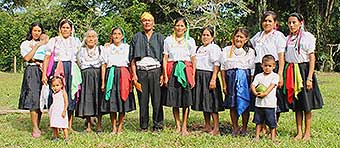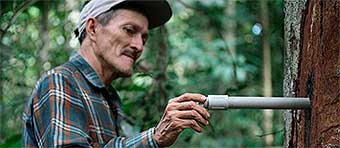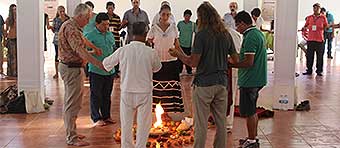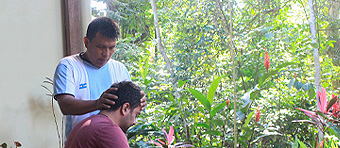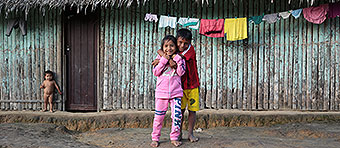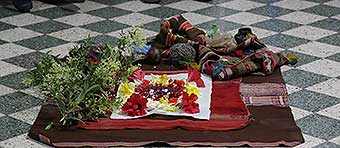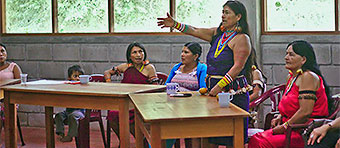Inter-American Council on Indigenous Spirituality - CISEI
CISEI (Inter-American Council on Indigenous Spirituality) is a non-profit Civil Association founded in 1996 in Mexico, with chapters in Argentina, Peru, Ecuador, Guatemala, Venezuela and Panama. It brings together traditional indigenous healers, academics, scientists and spiritual guides to build bridges between the scientific and philosophical knowledge of the West and the ancestral wisdom of indigenous peoples.
Since its creation, CISEI has been articulating his work through eight international forums - which took place in Mexico, Peru, Puerto Rico, Guatemala, Ecuador, Venezuela and Argentina - oriented, from an intercultural approach, to promote dialogue with ancestral knowledge systems for the peaceful development of contemporary society. Each forum included lectures, workshops and ritual ceremonies, and gathered from 150 to 300 persons.
Takiwasi Center, was the co-founder of CISEI through its Executive President, Dr. Jacques Mabit, coordinated the Peru Chapter, and took over the organization of the II Forum in 1998 and the VIII Forum in November 2015. The book “Foros Internacionales Espiritualidad Indígena y Mundo Occidental, Perú 2015” is an account of what happened in that meeting, with the wealth of exchanges that for the first time brought together indigenous and scientific representatives from other continents (Australia, Canada, Africa). Another result of this meeting was the Tarapoto Declaration CISEI 2015.
CISEI’s principles
CISEI believes that it is time for governments and societies to recognize that the contributions of indigenous cultures are fundamental elements in contemporary societies. In addition, these contributions should be revaluated and respected, because only then we will reclaim the respect towards cultural diversity and full spirituality of the person, something we dream of from the bottom of our hearts, which will strengthen the bridges between Western civilization and native cultures of our continent.
CISEI is a space of dialogue, respect and encounter in which converge indigenous and non-indigenous peoples of America and the world, whose main purpose is to help keep alive and revitalize the spiritual heritage of the native cultures of our continent, respecting the spiritual practices of today's cultures.
CISEI recognizes the existence of both the Western cultural heritage and the ancestral heritage of the peoples of the Americas and seeks to establish bridges for strengthening both wealth sources.
CISEI assumes the firm attitude of living harmoniously with nature, fighting for the improvement of the environment, recognizing that the earth, air, water and sun are the source of life - on which we all depend - and we have the duty to respect them and transmit them clean and healthy to future generations.
CISEI recognizes that, as part of ancestral heritages, a relevant form of access to knowledge is given through the ritual use of sacred plants for ceremonial and healing purposes - in their traditional and natural forms - by observing the ethical and moral principles inherent to them, and according to a sustained management based on the preservation and conservation of the botanical species, patrimony of humanity.
CISEI’s goals
Considering these principles, CISEI aims at the following goals:
- To promote knowledge, acceptance, development and respect of cultural and spiritual diversity in our continent, taking into account the dynamic fusion of the American peoples, favoring the reconciliation and the harmonious reunion of the indigenous roots with the western religious and cultural contributions that form an integral part of the contemporary spiritual heritage of the Americas.
- To reintegrate into our cultures the traditional habits, customs and forms of life bequeathed by our native ancestors of the American continent, such as the recognition of their relationship with nature, promoting protection, conservation, recovery and restoration of the cultural heritage of indigenous peoples.
- To promote the restoration, protection, conservation, recovery and maintenance of ceremonial and cultural sites, as well as access to them.
- To fight discrimination that - in social and, in some cases, legal practice - is imposed on our ancestral traditions, defending the right to perform religious ceremonies and to use plants and other sacred natural elements.
- To prevent and denounce the misuse and abuse of plants and sacred natural elements, and the denaturalization of their sources.
- To contribute to the affirmation of relations of friendship and fraternity among the peoples of the American continent, based on the dissemination of ancestral habits, customs and traditions, serving as an alignment point between the indigenous and non-indigenous peoples of the Americas and the world.
- To promote the organization of cultural, social, legislative, productive, educational, health and research projects that contribute to the application of CISEI's principles and social objectives.
- In accordance with the Universal Declaration of Human Rights promote the recognition and respect for the individual freedom to assume the religious belief that fulfills personal aspirations on private and social life, including the inalienable right to adopt the indigenous cultural heritage.
CISEI’s perspectives
Despite the logistical difficulties, the lack of support from government agencies and the lack of financial backing, this initiative, born from the enthusiasm of a few people, celebrated its two decades of existence in 2016, with many fruits. The time has come for a new generation to take up the baton, take on new initiatives and transmit its hopes. In this sense, Takiwasi, after 20 years of commitment (1996-2016), at the Board meeting in Chalmita, Mexico, in 2017, resigned from CISEI to undertake other initiatives and passed the baton to another team, hoping that this courageous adventure will continue.
The theme that generated the launch of this project is more relevant than ever. The indigenous peoples and cultures of the American continent remain in grave danger; The inappropriate use and appropriation of sacred ancestral medicines are experiencing exponential growth with so-called shamanic tourism and dubious forms of neo-shamanism in a New Age environment full of contradictions; mining exploration and oil-addiction represent an attack to biodiversity and trample on the rights of indigenous peoples...
At the same time, global awareness on ecological needs increases, initiatives of alternative forms of living multiply - ecovillages for example -, native peoples take the initiative of their own defense, Western science takes more seriously the ancestral wisdom and medicines, churches revalue the contributions of indigenous spirituality...
Useful Links
- Video recap of the VIII CISEI Forum, organized by the Peru Chapter from 25 to 28 November 2015, in Tarapoto Watch video
Contact Form
×A confirmation e-mail has been sent to your account.
